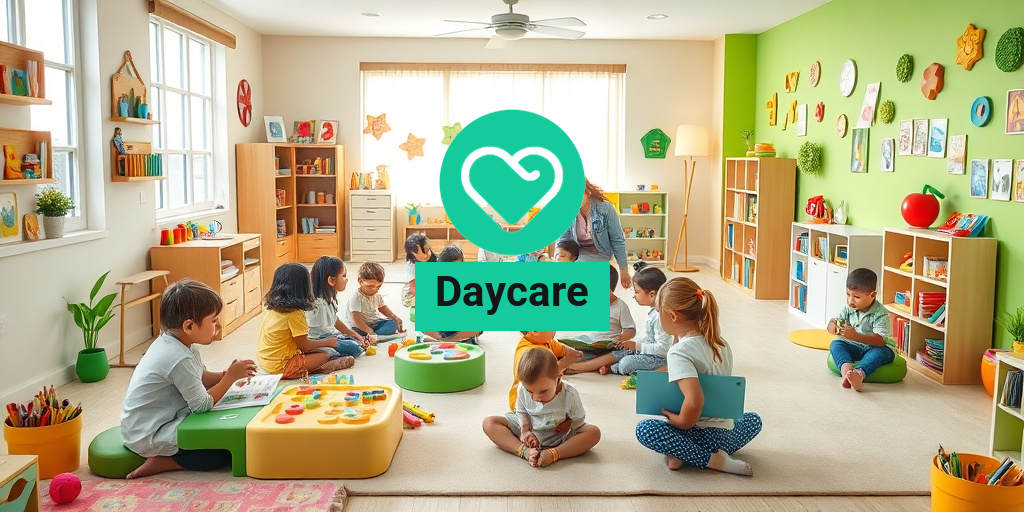What Is Daycare?
Daycare, often referred to as childcare, is a service that provides supervision and care for children during the day, typically while their parents are at work or engaged in other activities. Daycare can take various forms, including home daycare, daycare centers, and even specialized programs like Montessori daycare. The primary goal of daycare is to create a safe, nurturing environment where children can learn, play, and socialize with their peers.
Types of Daycare
- Home Daycare: Often run by individuals in their own homes, these settings provide a more intimate atmosphere for children, usually with fewer kids than larger centers.
- Daycare Centers: These facilities are typically larger and may offer a structured curriculum, including educational activities and socialization opportunities.
- Preschool: A type of daycare that focuses on early childhood education, preparing children for kindergarten and beyond.
- Drop-In Daycare: This flexible option allows parents to leave their children for short periods, making it ideal for those with unpredictable schedules.
- Adult Daycare: While primarily focused on children, daycare services can also cater to adults who need supervision and care during the day.
Daycare services are not limited to children; there are also pet daycare options for furry family members. Whether you’re searching for dog daycare near me or a reliable family daycare for your little ones, the options are plentiful!
Daycare Benefits
Choosing the right daycare can significantly impact a child’s development and a parent’s peace of mind. Here are some of the key benefits of enrolling your child in daycare:
Socialization Opportunities
One of the most significant advantages of daycare is the chance for children to interact with their peers. This socialization helps develop essential skills such as sharing, cooperation, and conflict resolution. Children learn to navigate relationships, which is crucial for their emotional and social development.
Structured Learning Environment
Many daycare centers offer structured programs that include educational activities designed to promote cognitive development. From arts and crafts to basic math and literacy, children are exposed to a variety of learning experiences that prepare them for future schooling. Programs like Montessori daycare emphasize hands-on learning, allowing children to explore and discover at their own pace.
Parental Peace of Mind
For working parents, knowing that their child is in a safe and nurturing environment can alleviate stress. Daycare centers often have trained staff, background checks, and safety protocols in place, ensuring that children are well cared for. This peace of mind allows parents to focus on their jobs and other responsibilities without constant worry.
Flexibility and Convenience
Daycare services often provide flexible hours, accommodating various work schedules. Options like drop-in daycare can be particularly beneficial for parents with unpredictable hours. This flexibility allows families to find a solution that works best for their unique needs.
Preparation for School
Daycare can serve as a stepping stone to formal education. Children who attend daycare often enter kindergarten with a head start, having already developed basic social and academic skills. This early exposure to a structured environment can ease the transition into school life.
Support for Working Parents
Daycare services can also provide essential support for working parents, allowing them to balance their professional and personal lives. Many daycare centers offer resources and programs that help parents navigate challenges, such as daycare assistance programs that can alleviate financial burdens.
In conclusion, daycare is more than just a place for children to stay while their parents are away; it is a vital component of early childhood development. With numerous options available, including doggy daycare for pets and various educational programs for children, families can find the right fit for their needs. For more information on health and wellness topics, consider visiting Yesil Health AI for evidence-based answers.
Whether you’re looking for a daycare center near me or exploring options for daycare jobs near me, understanding the benefits of daycare can help you make informed decisions for your family. 🌟

Daycare Health Guidelines
Ensuring the health and well-being of children in daycare settings is paramount. Daycare facilities must adhere to specific health guidelines to create a safe and nurturing environment. Here are some essential health guidelines that every daycare should follow:
1. Hygiene Practices
Maintaining proper hygiene is crucial in preventing the spread of illnesses. Daycare centers should implement the following practices:
- Regular Handwashing: Encourage children and staff to wash their hands frequently, especially before meals and after using the restroom. 🧼
- Sanitization: Regularly clean and disinfect toys, surfaces, and equipment to minimize germ transmission.
- Illness Policy: Establish a clear policy regarding illness. Children showing symptoms of contagious diseases should stay home to prevent outbreaks.
2. Nutrition and Meal Guidelines
Proper nutrition is vital for children’s growth and development. Daycare centers should provide balanced meals and snacks that meet dietary guidelines:
- Healthy Options: Offer a variety of fruits, vegetables, whole grains, and lean proteins.
- Allergy Awareness: Be aware of food allergies and ensure that meals are prepared safely to avoid cross-contamination.
- Hydration: Encourage children to drink water throughout the day, especially during outdoor play. 💧
3. Regular Health Checks
Conducting regular health checks can help identify potential health issues early. Daycare centers should:
- Monitor Symptoms: Keep an eye on children for any signs of illness, such as fever, cough, or rash.
- Vaccination Records: Maintain up-to-date vaccination records for all children to ensure they are protected against preventable diseases.
4. Mental Health Awareness
Children’s mental health is just as important as their physical health. Daycare providers should:
- Create a Supportive Environment: Foster a nurturing atmosphere where children feel safe and valued.
- Encourage Expression: Allow children to express their feelings and emotions through play and conversation.
Daycare Safety Measures
Safety is a top priority in daycare settings. Implementing effective safety measures can help protect children from accidents and injuries. Here are some key safety measures that every daycare should consider:
1. Secure Environment
Creating a secure environment is essential for preventing accidents. Daycare centers should:
- Childproofing: Ensure that all areas are childproofed, with safety gates, outlet covers, and secure furniture.
- Outdoor Safety: Regularly inspect outdoor play areas for hazards, such as sharp objects or unsafe equipment. 🌳
2. Emergency Preparedness
Being prepared for emergencies can make a significant difference in ensuring children’s safety. Daycare centers should:
- Emergency Plans: Develop and practice emergency plans for situations like fires, natural disasters, or lockdowns.
- First Aid Training: Ensure that staff members are trained in first aid and CPR to respond effectively in emergencies.
3. Supervision and Staff Training
Proper supervision and training of staff are critical components of daycare safety:
- Staff-to-Child Ratios: Maintain appropriate staff-to-child ratios to ensure adequate supervision at all times.
- Ongoing Training: Provide ongoing training for staff on safety protocols, child development, and emergency response. 👩🏫
4. Communication with Parents
Effective communication with parents is vital for ensuring safety and health in daycare settings:
- Regular Updates: Keep parents informed about health guidelines, safety measures, and any incidents that occur.
- Feedback Mechanism: Encourage parents to provide feedback and report any concerns regarding their child’s safety and well-being.
By adhering to these health guidelines and safety measures, daycare centers can create a nurturing and secure environment for children to learn and grow. 🌟

Daycare Nutrition Standards
When it comes to daycare, one of the most crucial aspects that parents often consider is nutrition. Ensuring that children receive balanced meals and snacks is essential for their growth and development. In this section, we’ll explore the key nutrition standards that daycare centers should adhere to, as well as tips for parents to ensure their children are getting the best possible nutrition.
Understanding Nutrition Standards
Daycare nutrition standards are guidelines that help ensure children receive the necessary nutrients for their age and developmental stage. These standards often align with recommendations from health organizations such as the U.S. Department of Agriculture (USDA) and the American Academy of Pediatrics (AAP). Here are some key components:
- Balanced Meals: Meals should include a variety of food groups, including fruits, vegetables, whole grains, protein, and dairy.
- Age-Appropriate Portions: Portion sizes should be tailored to the age and developmental needs of the children.
- Limit Sugars and Processed Foods: Daycare centers should minimize the use of added sugars and highly processed foods.
- Hydration: Access to water should be available throughout the day to keep children hydrated.
Sample Meal Plans
To give you an idea of what a nutritious day at daycare might look like, here’s a sample meal plan:
- Breakfast: Oatmeal topped with fresh berries and a glass of milk.
- Snack: Sliced apples with peanut butter.
- Lunch: Grilled chicken, quinoa, steamed broccoli, and a side salad.
- Afternoon Snack: Yogurt with granola and banana.
By following these nutrition standards, daycare centers can help foster healthy eating habits that children can carry into adulthood. Parents should feel empowered to ask about the nutrition policies at their chosen daycare center to ensure their child is receiving the best care possible.
Daycare Illness Policies
Illness policies in daycare settings are vital for maintaining a healthy environment for all children. Understanding these policies can help parents make informed decisions about their child’s health and well-being. Here’s what you need to know about daycare illness policies.
Importance of Illness Policies
Daycare centers are often breeding grounds for germs, making it essential to have clear illness policies in place. These policies help to:
- Prevent the Spread of Illness: By having guidelines on when to keep a child home, daycare centers can reduce the risk of contagious diseases spreading.
- Protect Vulnerable Children: Some children may have compromised immune systems, making them more susceptible to illnesses.
- Provide Clarity for Parents: Clear policies help parents understand what to expect regarding their child’s health and attendance.
Common Illness Policies
While specific policies may vary by daycare, here are some common elements you might find:
- Fever Policy: Children with a fever over 100°F should stay home until they are fever-free for at least 24 hours without medication.
- Contagious Illnesses: Children diagnosed with contagious conditions (like chickenpox or strep throat) may need to stay home for a specified period.
- Symptom Monitoring: Parents are often required to monitor their child for symptoms such as coughing, vomiting, or diarrhea before sending them to daycare.
It’s also important for daycare centers to have a plan in place for handling sick children who may need to be isolated until they can be picked up. This ensures that other children remain safe and healthy.
Communication is Key
Effective communication between parents and daycare staff is crucial. Parents should inform the daycare of any illnesses their child may have, while daycare staff should keep parents updated on any outbreaks or health concerns within the center. This partnership helps create a safer environment for everyone involved.
In conclusion, understanding daycare nutrition standards and illness policies is essential for parents seeking the best care for their children. By being informed, parents can make better choices and ensure their little ones thrive in a healthy and supportive environment. 🌟

Choosing the Right Daycare
Finding the perfect daycare for your child can feel overwhelming, but it’s one of the most important decisions you’ll make as a parent. With so many options available, from home daycare to daycare centers, it’s essential to consider various factors to ensure your child’s safety, happiness, and development.
Types of Daycare
Before diving into the selection process, it’s crucial to understand the different types of daycare available:
- Home Daycare: Typically run by individuals in their own homes, these settings often provide a more intimate environment with smaller groups.
- Daycare Centers: Larger facilities that can accommodate many children, often offering structured programs and activities.
- Montessori Daycare: Focuses on child-led learning and hands-on activities, promoting independence and creativity.
- Drop-in Daycare: Flexible options for parents needing occasional care without a long-term commitment.
- Doggy Daycare: For pet owners, these facilities provide a safe and fun environment for dogs while their owners are away.
Key Factors to Consider
When searching for a daycare near me, keep the following factors in mind:
- Location: Proximity to your home or workplace can make drop-offs and pick-ups more convenient.
- Staff Qualifications: Ensure that caregivers are trained and certified, especially in first aid and child development.
- Safety Measures: Look for facilities that prioritize safety, including secure entrances, childproofing, and emergency protocols.
- Curriculum: Investigate the educational programs offered. A well-rounded curriculum can significantly benefit your child’s development.
- Reviews and Recommendations: Seek feedback from other parents and check online reviews to gauge the quality of care.
Visiting Daycare Facilities
Once you’ve narrowed down your options, schedule visits to the daycare centers you’re considering. During your visit, pay attention to:
- The overall atmosphere and cleanliness of the facility.
- How staff interacts with children—are they nurturing and attentive?
- The activities and resources available for children.
- How the facility handles discipline and conflict resolution.
Don’t hesitate to ask questions about their policies, daily routines, and how they communicate with parents. This will give you a clearer picture of what to expect.
Daycare and Child Development
Choosing the right daycare is not just about convenience; it plays a crucial role in your child’s development. Quality daycare can provide a foundation for lifelong learning and social skills.
Socialization Opportunities
One of the most significant benefits of daycare is the opportunity for children to socialize with their peers. Interacting with other children helps them develop essential social skills, such as:
- Communication: Learning to express themselves and understand others.
- Sharing: Understanding the importance of sharing and taking turns.
- Conflict Resolution: Navigating disagreements and learning to compromise.
Structured Learning Environment
Many daycare centers offer structured learning environments that promote cognitive development. Programs often include:
- Creative Play: Activities that encourage imagination and creativity.
- Early Literacy: Exposure to books and storytelling to foster a love for reading.
- Basic Math Skills: Fun activities that introduce numbers and counting.
These early learning experiences can set the stage for success in preschool and beyond.
Emotional Development
Quality daycare also supports emotional development. Children learn to manage their feelings and develop resilience through various activities and interactions. They gain:
- Independence: Learning to make choices and solve problems on their own.
- Confidence: Building self-esteem through accomplishments and positive reinforcement.
- Empathy: Understanding and respecting the feelings of others.
In conclusion, selecting the right daycare is a vital step in supporting your child’s growth and development. By considering the type of daycare, visiting facilities, and understanding the developmental benefits, you can make an informed decision that aligns with your family’s needs. 🌟

Frequently Asked Questions
What is the meaning of daycare?
Daycare refers to a service that provides supervision and care for children or pets during the day, typically while parents or owners are at work or engaged in other activities. It can encompass various settings, including home daycare, daycare centers, and doggy daycare facilities.
How much does daycare cost?
The cost of daycare can vary widely based on location, type of care, and age of the child or pet. On average, parents can expect to pay anywhere from $200 to $1,500 per month for child care services. For pet daycare, prices typically range from $20 to $50 per day, depending on the services offered.
What types of daycare are available?
- Infant daycare – Specialized care for infants, often focusing on developmental needs.
- Preschool – Educational programs for children aged 3-5, preparing them for kindergarten.
- Family daycare – Care provided in a caregiver’s home, often in a smaller, more intimate setting.
- Montessori daycare – An educational approach that encourages self-directed learning.
- Adult daycare – Services for elderly individuals needing supervision and social interaction.
- Dog daycare – Facilities that provide care and socialization for dogs during the day.
How do I find daycare near me?
To find daycare near me, consider using online search engines or local directories. You can also ask for recommendations from friends, family, or local parenting groups. Websites and apps that specialize in child care or pet services can also provide listings and reviews.
What are daycare jobs like?
What is drop-in daycare?
Drop-in daycare is a flexible childcare option that allows parents to leave their children for a few hours without a long-term commitment. This type of care is ideal for parents who need occasional help or have unpredictable schedules.
Are there daycare assistance programs available?
Yes, many communities offer daycare assistance programs to help families afford childcare. These programs may include subsidies, grants, or sliding scale fees based on income. It’s advisable to check with local government agencies or non-profit organizations for available resources.
What should I look for in a daycare center?
When choosing a daycare center, consider the following factors:
- Licensing and accreditation
- Staff qualifications and child-to-staff ratios
- Safety and cleanliness of the facility
- Curriculum and activities offered
- Reviews and recommendations from other parents
Can I find dog daycare near me?
Yes, many areas have dog daycare facilities. You can search online for dog daycare near me or check local pet stores and veterinary clinics for recommendations. It’s important to visit the facility and ensure it meets your pet’s needs before enrolling.




